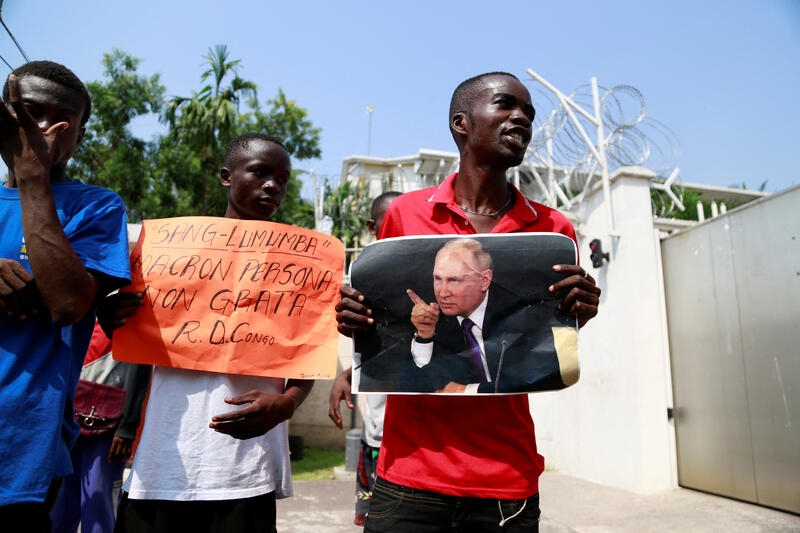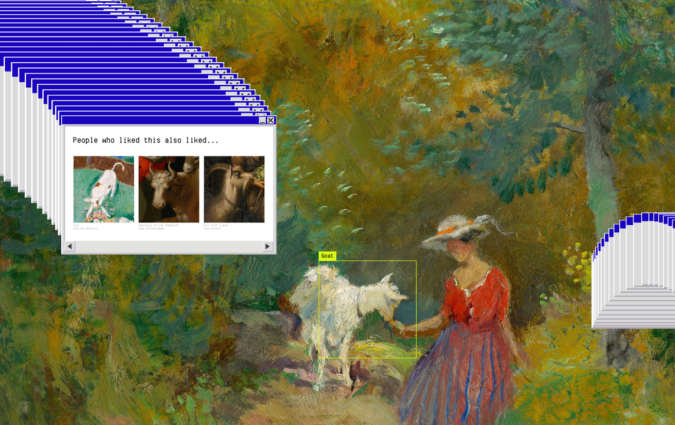As Trump silences Voice of America, Russia and China seize the opportunity to reshape Africa’s news ecosystem
Malians holds a photograph with an image of coup leader Colonel Assimi Goita, who overthrew the president and prime minister in 2021, and Russia's flag during a pro-Malian Armed Forces (FAMA) demonstration in Bamako, Mali, May 28, 2021. REUTERS/ Amadou Keita
When Donald Trump signed an executive order to gut the government-run agency overseeing Voice of America (VOA), among the first in line to celebrate were Russian and Chinese state officials.
“Today is a celebration for my colleagues at RT, Sputnik, and other outlets, because Trump unexpectedly announced that he’s closing down Radio Liberty and Voice of America, and now they’re closed. This is an awesome decision,” said Margarita Simonyan, RT’s chief editor.
The Global Times, a daily English-language tabloid and Chinese Communist party mouthpiece, published an editorial cheering on the decision, denouncing VOA as a “lie factory” that reports falsehoods on China.
Around the world, VOA provided some of the most dogged reporting on countries with heavily restricted media including in Africa, which is home to some of the countries ranked lowest in the RSF’s press freedom ranking. With VOA being potentially dismantled, who benefits the most from the void it is leaving in the African news ecosystem? I spoke to four African journalists and researchers to find out.
The void left by Voice of America
In early February Elon Musk, who is serving as the chief cost cutter of the Trump administration, advocated for shutting down VOA and Radio Free Europe in a post on X. “Nobody listens to [these networks] anymore," he said, adding that they are just “radical left crazy people talking to themselves while torching $1B/year of US taxpayer money.”
While perhaps the general American public does not broadly consume content made by VOA (from 1948 until it was amended in 2013 to adapt to the Internet age, the Smith-Mundt Act's § 501 forbade VOA from broadcasting directly to American citizens), it is very successful towards its intended audience abroad.
According to the U.S. Agency for Global Media (USAGM), the networks it funds, including VOA, reached 427 million people weekly in over 63 languages and more than 100 countries in 2024. To put this into perspective, this number widely surprasses other publicly funded international broadcasters according to self-reported figures from the BBC World Service and Deutsche Welle.
In Africa alone, the network provides services in local languages including Swahili, Afaan Oromoo, Kinyarwanda, Somali and Tigrigna. This allows VOA to reach audiences in countries such as Eritrea, Somalia, and Rwanda, where the boot of authoritarianism is stomping upon freedom of the press. According to USAGM’s latest figures, they have an audience of more than 93 million in Sub-Saharan Africa alone. What will happen with these audiences now?
“Journalism has been so essential in these places and in ensuring that these governments are held to account,” said a VOA journalist who is currently on administrative leave and with whom I spoke on the condition of anonymity.
The VOA journalist said that the end of VOA in Africa could create a void that other actors are eager to fill. With less international coverage, she explained, authoritarian governments in Africa could exert greater control over their citizens.
“This is creating a strategic void for adversaries,” she said. “If fact-based objective reporting is taken away, it weakens VOA’s reach, which is an essential pillar for telling the truth, but it also allows room for adversaries like Iran, Russia, and China, to dominate the information landscape.”
Not everyone would agree that VOA is a pillar of truth-telling. Actors like China and Russia have predictably denounced VOA’s coverage as lies and propaganda. But local officials have also attacked the agency and Trump’s executive order referred to VOA as “radical propaganda". When Kari Lake was selected as the new Director of VOA, she pledged “to get some real journalists once again” and tackle “fake news.”
“There's a lot of misunderstanding of what we do,” says the VOA journalist I spoke to. “We are an independent fact-based journalism institution. VOA adheres to journalistic standards such as accuracy, balance, fairness, providing audiences with reliable information.”
This journalist stressed that VOA often operated in countries and regions where authoritarian governments either control the media or where independent media has been decimated, which means that VOA often provides critical counterbalance to misleading narratives. In addition, they often cover stories on corruption and human rights violations.
“The absence of VOA reporting from these regions is critical to [authoritarian governments’] interest. This is why they are celebrating, especially in Africa, which means less exposure to their human rights abuses, to corruption, to authoritarian practices,” she said.
Eliud Akwei is an investigative data analyst at iLAB, the forensic data team at the technology and data journalism nonprofit Code for Africa. Akwei, who has extensively covered disinformation, said that VOA has provided an invaluable service in providing independent and fact-checked coverage on issues like the 2023 Nigerian election or the Tigrey War in Ethiopia, when politicians disseminated disinformation through official statements and social media platforms.
“In many African countries, government-controlled or state-sponsored media outlets are already the dominant sources of information. Without VOA’s independent coverage, these media channels could further strengthen their hold on the narrative, promoting government-approved messages and suppressing dissenting voices,” says Akwei. “Countries like Russia, China, and even regional players with their own agendas, might seize the opportunity to increase their influence in Africa.”
The actors looking to fill the void
For decades, both Russia and China have been making way into the news ecosystem in Africa via covert and visible methods. A month before the dismantling of VOA, Sputnik, one of Russia’s state-owned news agencies, opened its first editorial center in Ethiopia. Dmitry Kiselev, the head of the media company that runs Sputnik, said in the opening ceremony that they are planning on opening centers in South Africa and Tanzania to publish content in two languages: Swahili and Hausa.
RT, Russia’s state broadcasting arm, has opened offices in Algeria and has eyed new outposts in South Africa and Kenya as well. Their latest venture into the continent has been in the form of RT Academy. Launched last year, RT Academy is “an international education project” that seeks to train journalists and reporters from the continent in an effort to further expand their operations in Africa. According to a BBC deep-dive into the academy, lessons are riddled with Kremlin propaganda, disinformation, and pieces discrediting “Western media.”
Both RT and Sputnik have been actively expanding their presence in the region since Russia’s invasion of Ukraine, which led to many countries, including the EU, to block their news channels. Since then, RT has signed contracts with more than 30 African TV stations that now broadcast their content, Sputnik launched Sputnik Afrique, and both RT and Sputnik have increased the number of correspondents they have throughout the region.
China has also encroached on the African information system. Xinhua and CGTN, the official state news agencies, have over 37 bureaus in Africa. Similar to Russia, they have also partnered with local outlets to extend the reach of their content in addition to establishing journalist training initiatives. Chinese digital television operator Startimes, is available in at least 30 African countries, exposing millions of Africans to Chinese content.
The aim of Russia and China is to push narratives that promote their own country but they are doing it in different ways, said Samba Dialimpa Badji, a research fellow with the Decoding Digital Media in African regions of Conflict (DDMAC) Project and a PhD candidate at OsloMet University in Norway.
“For Russia, it’s really an anti-Western narrative where they’re saying that all your problems come from the West or from France [in the case of francophone Africa]. China is more saying ‘We are your friends’. It’s more about showcasing Chinese culture, the Chinese way of life, and what China can bring to Africa,” said Badji, who is also a Senegalese journalist with over 20 years of experience and the former editor-in-chief of Africa Check's francophone bureau.
Code for Africa’s Akwei said that one of the key narratives they have been tracking is the idea that the West is immoral and seeks to impose on African countries tendencies that are inconsistent with the people’s cultural values. For example, support for the LGBTQIA+ community is often used as an example of this ‘immorality’.
“Another key narrative is the reminder of Africa’s history of colonialism and the neocolonialism that exists today,” he said. “These actors stress that their countries never colonised Africa, whilst emphasising that the West still controls African governments.”
When I spoke to Steven Gruzd, head of the African Governance and Diplomacy programme at the South African Institute of International Affairs (SAIIA), he stressed that, in addition to employing traditional media, the Kremlin also has a strong presence on digital platforms.
“Social media becomes a repackaging place where news is disseminated and spread,” he said. “It goes into the local cracks, the local grievances, and tends to amplify that. We’ve also had the well-known phenomenon of troll farms, where Russia is employing people to spread messages and have social media personas.”
The VOA journalist I spoke to pointed out that disinformation coming from Russia takes form through more covert means. “We’ve seen deepfakes being used as people who are legitimate and broadcasting in Francophone countries, and we’ve also seen ghost reporters writing for pro-Russian propaganda in West Africa,” she said.
The Kremlin has also partnered with local media outlets to gain legitimacy and more ground in the region. They also deploy coordinated social media networks to launch disinformation campaigns across the continent.
While Russia is the most visible actor in this space, all journalists I spoke to pointed at China being also a growing player in this space.
“If China is investing in a country, they just side with whoever has control; usually, in these African countries, it would mostly be governments,” says the VOA journalist. “[For example], if they buy land and uproot a certain community, and there are environmental issues for the investment that they're probably going to be pouring a lot of money into, they don’t want that side of the story to be told. They will be telling you a story about how they’ve transformed the community’s lives.”
Back in 2018, journalist Azad Essa wrote about his experience when he discussed the persecution of more than one million Uighur Muslims in China’s Xinjiang province in a weekly column he wrote for a South African newspaper. Chinese state-linked firms held a 20% stake of the newspaper. A week after writing the piece, which was not published, the newspaper cancelled his column.
“They are seeing it as exerting their soft power, but with the caveat that they are not exporting free press. They are exporting what they do in their home countries, meaning cracking down on dissent and cracking down on journalists,” said the VOA journalist.
Badji pointed out that there is an overlooked actor that is also trying to encroach in the information ecosystem in Africa: Turkey.
“[Turkey] has an economic interest as they have invested a lot in many African countries, and they have a military interest now too,” he said.
Just last month, Turkey’s state-owned Turkish Radio and Television Corporation (TRT) launched TRT Somali, their latest addition to its media networks in Africa. After launching TRT Afrika in 2023, the group has moved to operating in multiple nations in the continent, including Gambia, Morocco, Nigeria, and Cameroon.
Beyond the loss of VOA
At present, the future of VOA seems shaky at best. Currently, all of VOA’s 1,300 employees have been placed on leave. However, last week, a federal judge ordered the administration to temporarily pause its efforts to shut down VOA by stopping the government from firing its employees. The ruling did not require the network to resume broadcasting. While some VOA staffers have filed a lawsuit against the Trump administration for shutting down USAGM and thus dismantling all their networks, it is unclear when they would be able to start broadcasting again – if that happens at all.
“Lack of independent reporting diminishes the ability to effectively engage with audiences, make policy changes or policy engagement even for policy makers here and elsewhere, ” said the VOA journalist I spoke to. “There's also going to be a journalistic setback for African media because VOA has trained so many local journalists.”
Gruzd from SAIIA says the departure of VOA will certainly not deter Russia from further investing in the African continent, particularly as Western sanctions continue to be imposed. He describes how Russia has historically increased their presence in the Global South after being isolated. We saw this during the 2008 invasion of Georgia, during the invasion of Crimea in 2014, and during the ongoing full-scale invasion of Ukraine from 2022.
“Russia has made a big deal out of whatever foreign relations it can get,” Gruzd said. “So when it hosts meetings or when [Russian Foreign Minister] Lavrov travels around to various meetings, that’s a big story for Russia to say, ‘Look, we're not isolated.’” Russia has been in the influence game for 100 years at least, and it's not going to stop now.”

Akwei said that the narratives being spread by these actors have already succeeded as they feed into the disaffection against governments that are perceived to be puppets of the West, especially France.
“These narratives have contributed to the sentiments that led to the coups d’Etat in Burkina Faso, Mali and Niger,” he said. “The mass departure of Western and UN peacekeeping troops from countries such as Burkina Faso, Chad, Mali, Niger and Senegal followed coordinated campaigns calling for their exit.”
Akwei said that fact-checking and forensic research are key tools and should be used to tackle what he calls “information manipulation.” Journalists should pair debunking misinformation with investigating where these campaigns come from, and then should investigate who the intended audience is to be able to disrupt the underlying illicit financial flows that bankroll them.
“First, we need to reframe what the problem actually is. Whilst mis- and disinformation still exists, we have noticed the exploitation of narratives like neocolonialism that are not necessarily false to manipulate public sentiments. This is why the framing of the problem as information manipulation and interference is important,” he said.
The African media ecosystem is already reeling from various changes caused by the Trump administration, including the USAID cuts that funded many independent news organisations and the likely retreat of Meta from funding independent fact-checkers around the world.
Other international media groups have also been retreating from Africa. The BBC World Service cut approximately 50 out of 130 jobs in its Africa Service in 2022 as part of a shift from traditional television and radio to digital distribution. Earlier this year, they announced that they would cut 130 jobs globally as part of a plan to save around £6m in the next financial year. Last month, more than 50 former BBC World Service senior journalists warned the government that China and Russia will step into any gap left by the broadcaster as it faces possible cuts to its funding, according to The Times.
“It’s very sad to see cutbacks, especially in radio since it is such an important medium on the continent,” said Gruzd. “I don't know if throwing more money at the problem is going to solve the disinformation wave, but I don’t know what else there is if it’s not building up the capacity of newsrooms and strengthening journalism.”
For Badji, however, the solution does not lie in African audiences relying on international media houses, Western or otherwise, but to have a pan-African media group modelled after these outlets that is able to give the African perspective.
“Even to have reliable information about what is happening in Africa, we are obliged to go and see what Al Jazeera is saying, what RFE [Radio Free Europe] is saying, what the BBC is saying, and I think that’s a big issue,” he said. “It can be a cliche but it's really important to have an African narrative about what's going on in the world, how Africans are seeing what's happening in the world, how Africans are reporting what's happening in the world, but we don't have that.”
In every email we send you'll find original reporting, evidence-based insights, online seminars and readings curated from 100s of sources - all in 5 minutes.
- Twice a week
- More than 20,000 people receive it
- Unsubscribe any time
signup block
In every email we send you'll find original reporting, evidence-based insights, online seminars and readings curated from 100s of sources - all in 5 minutes.
- Twice a week
- More than 20,000 people receive it
- Unsubscribe any time







